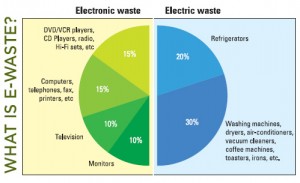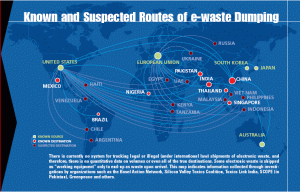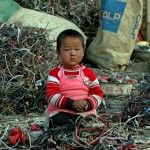The other day I was cleaning out my room and found a pile of old CDs that I no longer had any use for (Hanson and I parted ways a long time ago). Now, I know what I’m supposed to do when I want to get rid of old electrics and the like: recycle them. I was moving and in a pinch and didn’t have the time to run to the nearest Best Buy so I tossed them in the can. It’s been haunting me ever since.
The thing is that I knew better. Why? Because I already wrote a research paper on electronic or electric garbage, i.e. e-waste (this may be considered blog post cheating) and learned about the bad effects it has on the environment and people affected by it. My few CDs were only a small contribution to this larger issue, although by no means harmless; but I started to think about whether trashing versus recycling really is better.
garbage, i.e. e-waste (this may be considered blog post cheating) and learned about the bad effects it has on the environment and people affected by it. My few CDs were only a small contribution to this larger issue, although by no means harmless; but I started to think about whether trashing versus recycling really is better.
It’s a double-edged sword when it comes to whether you just throw away your old e-waste or recycle it. Either way you can never really be sure you’re doing the right thing. It seems like a no-brainer, right? Recycling trumps trashing. This is the environmentally conscious way to avoid being a part of the problem and creating more needless garbage by disposing of something in a suitable way. But this golden rule does not apply when it comes to e-waste.
When you throw away the electronics, and we do get rid of a lot in the US, less than 20% is even  recycled. The stuff that is thrown away ends up in landfills and incinerators which pose a possible threat of toxins leaching into the ground and the atmosphere. Not a promising thought. What about that idealistic thought of doing your environmentally-sound civic duty and recycling your e-waste? This is when things really get tricky…and disheartening.
recycled. The stuff that is thrown away ends up in landfills and incinerators which pose a possible threat of toxins leaching into the ground and the atmosphere. Not a promising thought. What about that idealistic thought of doing your environmentally-sound civic duty and recycling your e-waste? This is when things really get tricky…and disheartening.
Recycling is great when you can take it to somewhere like Best Buy and know that your e-waste will be managed properly. Places like this are great; however, even these kinds of places have limitations on what they’ll accept and if your item is big you better be ready to fork over the cash to have it picked up. There are private, for-profit companies specializing in e-waste recycling that will come collect your e-trash, but be prepared to pay for that too. It’s great to think everyone would 1) have the forethought to do this, and 2) be willing to fork over cash to save the environment; but the reality is highly unlikely.
Another huge barrier in getting your stuff properly recycled is that there is no standard for this in the US. E-waste recycling management is something decided through state legislation, meaning that recycling programs can vary drastically. This is complimented by federal strategies, not by solid recycling policies or legislation, that encourage commitments from e-waste producing industries promising that they’ll start taking back old and used products to recycle properly.
The darkest side of the recycling is when those well-intentioned recyclables end up being exported illegally to less industrialized and regulated countries like China or India where the damage to human health is disastrous. These countries have informal recycling sectors where people, including children,  are exposed to serious health hazards both directly through the waste and indirectly through toxins leached into their environments.
are exposed to serious health hazards both directly through the waste and indirectly through toxins leached into their environments.
It may not seem like it after this post, but I still believe that recycling is always a better option than just trashing those CDs. Legitimate options are out there, it just takes that personal-level of commitment to actually seek them out and follow through. Yes, there needs to be more political action from our part as the citizens, but the first step to doing better is to actually learn about the issue and see what role you play in it.


